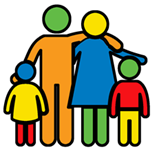Losing a baby is a very sad and difficult experience to cope with. This is true however your baby dies. From the moment you know a baby is on its way it is natural to start to imagine the relationship you will share with them.
Whether your baby dies during pregnancy or after they are born, your grief and sadness about the loss of your child can feel overwhelming. It is sometimes hard for others to understand how you feel and people tell us it can feel very lonely.
You may find you and your partner grieve in different ways and at different times from each other. You may have other children who need support to understand what has happened.
You don’t have to cope with this experience on your own. There is support available to help you deal with the grief of baby loss. Take a look at some of the links below for details of organisations which offer information, advice and support.
Partners
When a baby dies it can affect your relationship with your partner, friends and family. This can be another hard thing to cope with.
 You will have experienced the same loss, but that does not mean you will react in the same way at the same time. It can be very confusing to try and understand this and can make it hard for you to always support each other in the way you would like to.
You will have experienced the same loss, but that does not mean you will react in the same way at the same time. It can be very confusing to try and understand this and can make it hard for you to always support each other in the way you would like to.
Some people find they can show and talk about their feelings of grief. Others will be quiet and use distractions to try and cope with their loss.
There is no right or wrong way to grieve. It does not mean one of you is suffering more than the other. Accepting you are doing it differently is an important step.
Communication
Finding a way to communicate with each other makes misunderstandings less likely.
As time goes by you might decide to try couple counselling. Sometimes having a third party can help you make sense of each other’s point of view.
Other Children
 It can be really hard to know how to support your children after the loss of their baby brother or sister, when you are trying to cope with your own grief. It is important that you look after yourself and get the support you need.
It can be really hard to know how to support your children after the loss of their baby brother or sister, when you are trying to cope with your own grief. It is important that you look after yourself and get the support you need.
We have lots of information on Just One Norfolk to help you understand how children grieve and how you can talk to them about what has happened.
Friends & Family
Friends and family can be a big support after a baby has died. You may have people who you can always rely on in hard times. Some of your friends and family may have had similar experiences.
 Some friends and family may worry about what to say and how to help you. They may avoid you because of a fear of ‘getting it wrong’. Some might just ‘not get it’ and cause upset and pain by saying things that hurt you. Mostly people are trying to be supportive but it doesn’t make it any less painful at the time.
Some friends and family may worry about what to say and how to help you. They may avoid you because of a fear of ‘getting it wrong’. Some might just ‘not get it’ and cause upset and pain by saying things that hurt you. Mostly people are trying to be supportive but it doesn’t make it any less painful at the time.
Grief is unpredictable. There might be days when you want to see and be supported by others and other times when you want to be alone. This is very much your call – it is ok to do what feels right for you and to change your mind too.
Support
Put everyone in the picture or you could ask someone close to let people know on your behalf.
Let friends know what you need from them – sometimes a group email / text saying you;
As time goes by people can sometimes ask you less about how you are and how you are all coping. This can be hard – you will have found out who you can rely on in the early days. It is okay to let those close to you know if you are having a bad day or have an important anniversary coming up.
Sharing Experiences
Sometimes self-help and support groups where people share an understanding of what it is really like for parents who lose a baby can be really helpful, and be a community you can turn to for support. There are links below that can signpost you to some of these.
Self-Care
Grieving for your baby is a long haul and it is important to care for yourself. Focus on the basics in the early days.
Try to spend some time with each other and with other people you feel comfortable with. Sometimes you might want to talk, other times you might just need to be quiet with each other.
Physical Recovery
At this time we recognise that your own physical recovery may not be your main priority, or on your mind at all. This booklet is designed for women after pregnancy, to support and guide you when the time is right for you to start doing exercise.
When to Seek More Support
Everybody’s grief is different and how it affects you will vary from person to person. Sometimes struggling with such a sad life event can affect your mental health. It is important you ask for help if you are struggling.
If your low mood is;
This could mean you are becoming depressed. It is important you tell someone and get professional help.
You might find that you have bad memories of what happened that ‘replay’ in your mind. This trauma can be hard to deal with.
See your GP or another health professional to talk about how you have been feeling since you lost your baby. You could get in touch with NHS Talking Therapies Service Norfolk and Waveney for support.
If you do not feel ‘safe’ and think you might hurt yourself, you should ask for an emergency GP appointment or go to A&E.
Memories
Your baby will always be an important part of your family. Finding ways to keep special memories safe and to mark special days can be a comfort over time.
Finding a place that feels meaningful to visit, when you want to spend time thinking about your little one can be comforting.
Parents are often very creative in finding ways that help them to remember and keep safe their special memories. There are some ideas below that you might like or you may well come up with your own;
 Plant a tree or flower
Plant a tree or flowerPlanning ahead about how you will face ‘special days’ and anniversaries can take some of the stress away from the build up. There are ideas in this information sheet on how you might do this.
You may want to do this as a couple and / or with wider family and friends or you may decide to do something alone. You might want to do a bit of both. There is no right or wrong way to spend these days and it may be ‘trial and error’ to find out what works for you.
You may want to remind other friends and family that a special date is coming up. It can be hard when people don’t hold it in mind when it is so very important to you. Letting people know in advance means they can offer you the support you need.
Practicalities
After a baby dies it can be hard to know what you need to do and who you need to let know.
It is not easy to have to make decisions at such a difficult time – some might need to be made quite soon and others can wait. You might feel you want to do everything yourself or some people like to ask a person they trust to help them organise what needs to happen.
You can talk to the health professionals supporting you about this. There is advice and information available online too.
Next Pregnancy
After the experience of baby loss it is understandable that any future pregnancy might cause you more worry and anxiety. It might trigger a lot of memories some might be good and others bad. Health professionals realise this and will be keen to offer you extra support.
You might decide to ask to see a specialist obstetrician when you are planning your next pregnancy. Or you may already be pregnant and want extra advice and support in this pregnancy.
This additional support may mean that you will be under the care of a specific consultant obstetrician in the next pregnancy in one of their specialist clinics. This will depend on the individual circumstances and gestation, or age when your baby died.
Your Community Midwife will also wish to support you when you book your next pregnancy after a previous baby loss. She will help to advise you, ensure you are referred to the most appropriate Consultant, as well as understanding and supporting your individual circumstances, anxieties and concerns during this next pregnancy journey.
You can contact the Healthy Child Programme by calling Just One Number on 0300 300 0123 or texting Parentline on 07520 631590. Our opening hours are 8am-6pm Monday-Friday (excluding bank holidays) and 9am-1pm on Saturdays.
If you are 11-19 you can text Chathealth on 07480 635060 for confidential advice from one of the Healthy Child Programme team.
To speak to other Norfolk parents and carers, you can join our online community forum below.